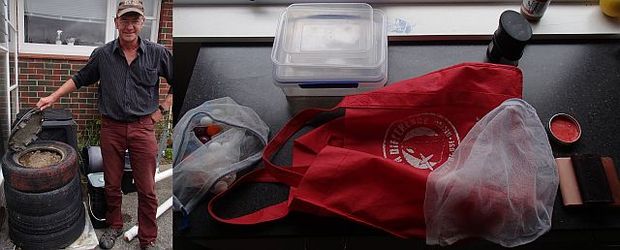
Trevor Staines demonstrates his home-made worm farm (constructed from old tyres and a car hubcap) that he uses along with a compost bin and a bokashi bucket for his family's organic waste (left), and a selection of reusable containers that the family take shopping to avoid plastic bags and polystyrene containers. They buy items such as unwrapped saop from a wholesaler to further avoid packaging (images: A. Ballance)
Despite the Waste Minimisation Act (2008) New Zealanders send nearly 2.5 million tonnes of waste to landfill each year, with almost a quarter of that coming from organics (2011 figures from Ministry for the Environment) - that is over a tonne of rubbish per household per year. And about three-quarters of all that waste could have been potentially diverted from landfill and recovered, reused or recycled.
Environmental sociologist Corrina Tucker and environmental anthropologist Trisia Farrelly from Massey University are interested in waste minimisation, and in developing easy effective ways of helping individual households reduce their waste.
They recruited 4 Palmerston North families to take part in a recycling and rubbish study, and Alison Ballance joined the researchers, and study member Trevor Staines, to find out more.
By avoiding buying packaging (taking their own plastic containers to the butcher, using reusable bags instead of plastic bags and buying unwrapped goods such as soap from a bulk wholesaler), by diverting all organic waste to a compost bin, bokashi bucket or worm farm, and by being effective recyclers, the Staines family had reduced their waste by 75%, from four rubbish bags a month to just one.
However, the researchers concluded that it is currently difficult for even motivated households to minimise waste, and that to make it easier they believe there needs to be national guidelines developed, for example around product stewardship, limits on use of non-recyclable plastics, and sourcing better markets for recyclables, as well as a more general pro-environmental attitude that encourages both producers and consumers to actively pursue waste minimisation.
They note that they discovered during the study that levels of contamination of the material put out for recycling is high (nationally 20% of recycling is contaminated and must be taken to landfill), and that while plastic types 3, 4,and 7 are currently collected in kerbside collections there is no market for them and they end up at landfill.


